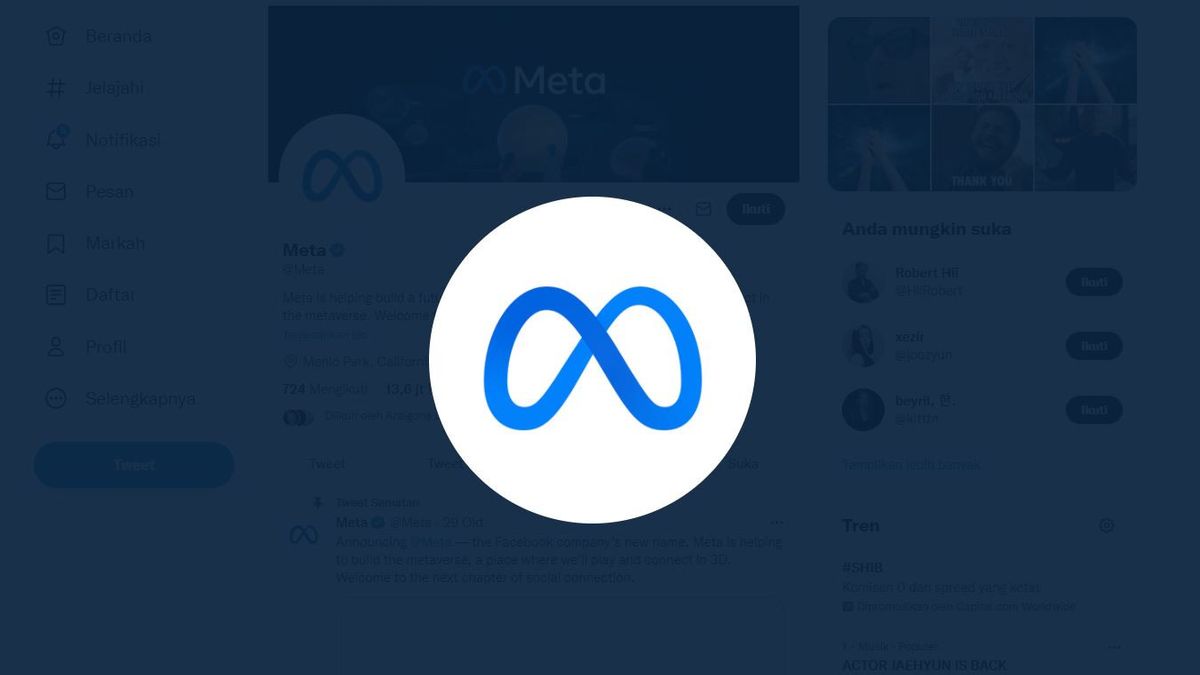JAKARTA - Early adopters of cyberspace known as the metaverse, have criticized Facebook's rebranding as an attempt to capitalize on the growing buzz over a concept it didn't create.
The term metaverse has become the tech buzzword of the year, as companies and investors are keen to be part of the next big thing. But users have spent years in this rapidly evolving but obscure virtual world.
"They're basically trying to build on what we've been building for years, but turning it into their own," said Ryan Kappel, an American scientist who for more than two years has been holding meetings in various metaverses.
Facebook's name change to Meta Platform and details of its plans to build its own immersive digital world, announced on Thursday, October 27, come as the company faces criticism from lawmakers and regulators over its market power, algorithmic decisions, and policing violations on its service. .
In cyberspace, users can walk around as an avatar, meet friends, and play games. Some that are based around blockchain also allow users to speculate on virtual real estate.
“I think Facebook has made this initial name change to legally secure the new trademark as soon as possible as more brands are interested,” said a UK-based crypto investor known as Pranksy. He also said that he first bought virtual real estate around early 2020.
No one makes jumping around the metaverse look easier than @KhabyLame https://t.co/Mw9iYqmeJg pic.twitter.com/vN7iWPGoZf
— Meta (@Meta) October 30, 2021
Artur Sychov, who founded the Somnium Space metaverse in 2017, said Facebook CEO Mark Zuckerberg's announcement of a brand change felt "hurried... like trying to fit themselves into the metaverse narrative that's happening right now."
Sychov spends up to five hours a day in Somnium Space along with 1,000 to 2,000 other daily users.
Dave Carr, communications lead at the organization that runs the virtual world of Decentraland, said Facebook's move may be met with resistance from metaverse users who are wary of its control over content.
"People who want to define the future of the cyberspace they inhabit, retain ownership of their creative output and move freely between them will choose the decentralized version," he said. Carr also described Decentraland's metaverse environment as decentralized and Facebook's plans likely centralized.
Decentraland, was founded in 2017 with around 7,000 daily users today. Decentraland has established itself as an alternative to traditional social media platforms that sell user data and control the content users see.
Many existing metaverse platforms are based on blockchain technology which makes central control impossible. Blockchain is the distributed ledger architecture that underlies cryptocurrencies. In this virtual world, people use cryptocurrencies to buy land and other digital objects in the form of non-fungible tokens (NFT).
However, reactions from early metaverse adopters were not all negative. Some said the inclusion of Facebook could increase interest in the virtual world concept in general, attract more users and support the development of multiple virtual worlds.
Tristan Littlefield, co-founder of NFT company nft42 and a metaverse user since 2018, said his first reaction to Facebook's announcement was negative because he didn't like selling user data.
But "having a giant like Facebook come in and just throw away billions of dollars ... can be a positive thing" because of the new people it will bring into space, he said.
The English, Chinese, Japanese, Arabic, and French versions are automatically generated by the AI. So there may still be inaccuracies in translating, please always see Indonesian as our main language. (system supported by DigitalSiber.id)













